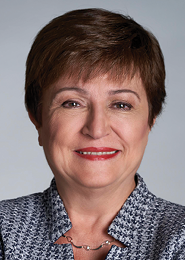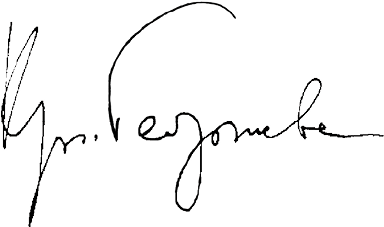- Home
- Media Kit
- Current Issue
- Past Issues
- Ad Specs-Submission
- Ad Print Settings
- Reprints (PDF)
- Photo Specifications (PDF)
- Contact Us

![]()
ONLINE


Kristalina Georgieva
Managing Director, International Monetary Fund
We are emerging from the most challenging 16 months of our lives, yet the shadows of this unprecedented crisis remain. There is hope because millions of people are benefiting from vaccines and because the global economic recovery is under way. But too many lives and livelihoods are still ravaged by the pandemic, young people and women continue to bear the brunt of the crisis, and far too many face rising poverty, homelessness and hunger.
If we are to lift these shadows, we must take the right actions now. We must work together to secure the recovery and build a more resilient and inclusive post-pandemic world. It is not going to be easy to transform our economies, but it will make a huge difference for the well-being of our society. On a personal note, I am reminded of another historic turning point. I was born behind the Iron Curtain in a world that no longer exists. Its collapse caused a great deal of pain to ordinary people – I vividly remember how hyperinflation wiped out in days my mother’s life savings. On the whole, the transition to a market economy was worth the pain, as it opened up access to opportunities and brought improvements in living standards for millions of people. But I wished back in those days more attention had been paid to the impact policies had on the most vulnerable people.
This experience, and my decades of work at the World Bank, the European Commission, and the IMF, have taught me an important lesson: policies must always be about people, and we always have to be mindful not only of the benefits they bring, but also of the potential negative impacts and how these impacts can be mitigated.
To lead the IMF at this pivotal moment is intense, humbling, and truly inspiring. Intense because never in our history have we delivered so much so swiftly: $110 billion for 84 countries to help them fight the crisis. Humbling because the horrific impact of the pandemic reminds us how interconnected and interdependent we are, and how dependent we are on Mother Nature. As we beat the pandemic, we must step up our fight against the climate crisis. Inspiring because I have seen first-hand how our membership of 190 countries has come together to seek a way forward. We are now preparing an unprecedented allocation of Special Drawing Rights of $650 billion which will boost all members’ ability to face adverse shocks.
Today we witness a two-track economic recovery that is increasingly driven by a two-track pandemic. A small number of advanced and emerging economies are powering ahead, while poorer countries are falling behind. That is fueled by the uneven distribution of vaccines across the globe. We know what has to be done: we must end the health crisis everywhere.
Ahead of the G7 Summit, the IMF published a $50 billion roadmap to accelerate the equitable distribution of health tools. With an aim to vaccinate at least 40 percent of the global population by the end of this year, and 60 percent by mid-2022, the plan is supported by the World Health Organization, the World Trade Organization and the World Bank. By boosting economic activity, this effort would lead to estimated gains of $9 trillion by 2025 – making it the best public investment ever.
Coming out of the frenzy of these last months one conclusion is clear – the urgent need to increase the world’s resilience. We know that the cost of being unprepared far outweighs the cost of investing in resilience. We know that coordinated efforts are critical. Just one example: we did not have another global financial crisis last year, partly because we had worked together over the past decade to strengthen our banking systems. Now we must do everything in our power to boost the resilience of our economies.
We need to fully embrace the concept of investing in people – in their health, social protection, and education, thus ensuring greater access to opportunities. We must build on the digital transformation that the pandemic has hastened. We must accelerate climate actions by implementing well-sequenced mitigation and adaptation strategies.
The good news is that a new momentum is building towards greener, smarter, and more inclusive economies. It is our common responsibility to seize this historic opportunity for transformation. As we work together to dispel the shadows of the crisis, we can build a brighter future for all.

Kristalina Georgieva
Managing Director, International Monetary Fund